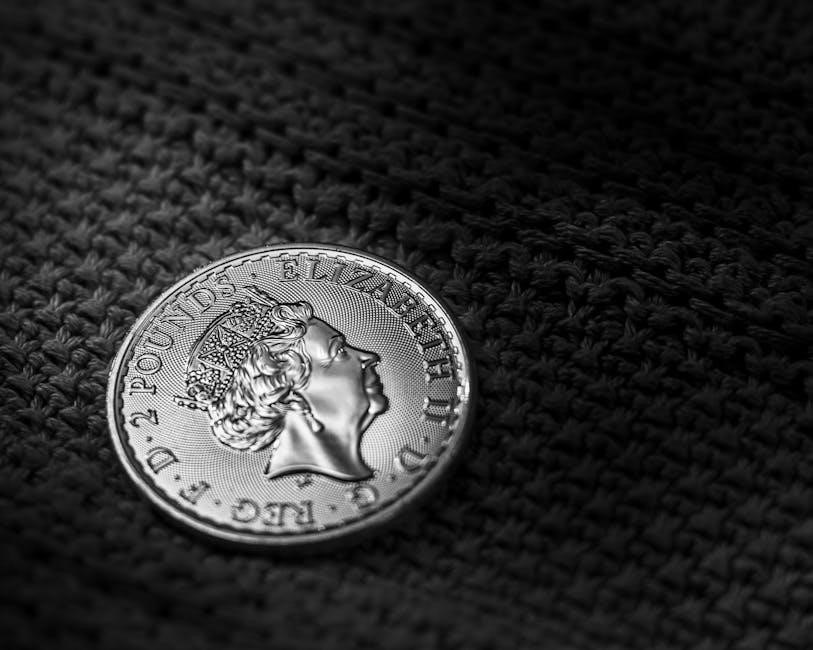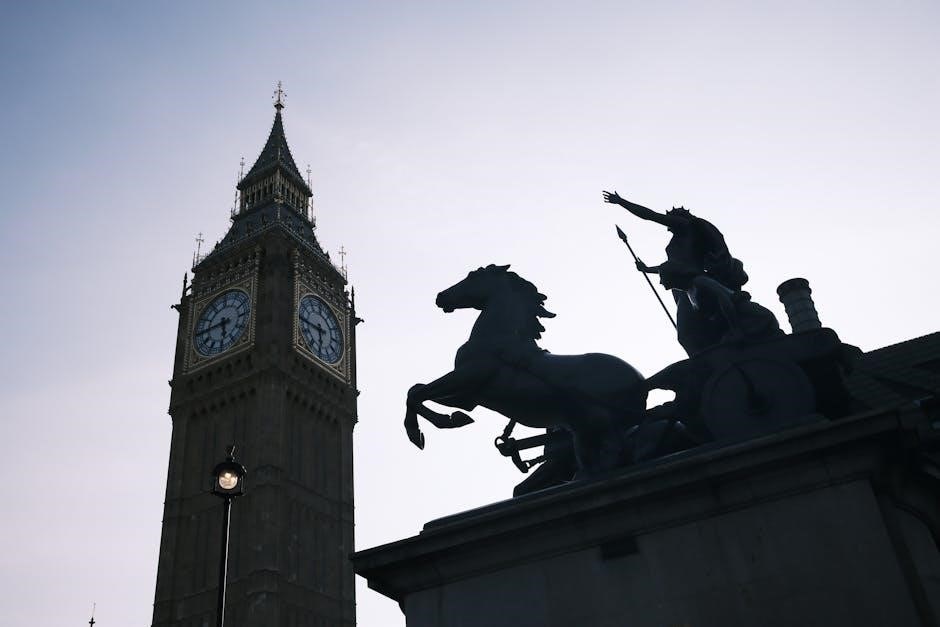tilbury speech by queen elizabeth i pdf
The Tilbury Speech, delivered by Queen Elizabeth I in 1588, is one of her most famous addresses. It was spoken to English troops assembled at Tilbury Camp, rallying them against the Spanish Armada. The speech is renowned for its strong rhetoric, patriotic themes, and Elizabeth’s display of leadership and determination. It has become a symbol of English resilience and a defining moment in her reign, celebrating her role as a unifying national leader.
1.1 Historical Significance
The Tilbury Speech holds profound historical significance as a pivotal moment in English history. Delivered by Queen Elizabeth I in 1588, it rallied troops against the Spanish Armada, embodying the spirit of national resistance. The speech underscored Elizabeth’s leadership and reinforced her image as a strong, unifying monarch. It symbolized England’s defiance against foreign threats and highlighted the queen’s ability to inspire loyalty and courage. The address is celebrated for its impact on morale and its role in shaping England’s identity during a time of crisis. Its legacy endures as a testament to Elizabeth’s oratory skill and her enduring influence on British culture and history.
1.2 Elizabeth I’s Role
Queen Elizabeth I played a pivotal role in rallying her troops during the Tilbury Speech, embodying strength and determination. Her appearance at Tilbury Camp, dressed in armor, symbolized her commitment to defending England. Elizabeth’s leadership was marked by a unique blend of authority and empathy, as she addressed her soldiers with both maternal care and warrior resolve. She positioned herself as a unifying figure, bridging the gap between monarch and people. Her rhetoric emphasized shared destiny and national pride, fostering loyalty and courage among the troops. This speech cemented her image as a strong, decisive leader and reinforced her connection with her subjects, leaving a lasting legacy in English history. Elizabeth’s role was not only to inspire but also to embody the spirit of resistance against the Spanish Armada.

Historical Context of the Tilbury Speech
The Tilbury Speech occurred in 1588 as England faced the Spanish Armada’s invasion threat. Elizabeth addressed troops at Tilbury Camp, a pivotal moment in English history, rallying defense efforts.
2.1 The Spanish Armada Threat
In 1588, England faced a significant threat from the Spanish Armada, a powerful naval force sent by King Philip II of Spain. The Armada aimed to overthrow Queen Elizabeth I, restore Catholicism, and conquer England. This invasion force comprised over 130 ships and 25,000 sailors and soldiers, posing a formidable challenge to England’s defenses. The Spanish sought to unite with Catholic rebels in England and topple Elizabeth’s Protestant government. The threat was exacerbated by England’s limited naval resources and the fear of Spanish dominance in Europe. Elizabeth’s leadership during this crisis was pivotal, as she rallied her troops and strengthened national resolve against the impending invasion. The Spanish Armada’s approach created a state of emergency, prompting Elizabeth to deliver her famous Tilbury Speech, a moment that would define her reign and inspire her people. The threat was real, and the stakes were unimaginably high.
2.2 The English Troops at Tilbury
The English troops at Tilbury were assembled in 1588 to defend against the Spanish Armada’s imminent invasion. These forces included local militia, volunteers, and professional soldiers, eager to protect their homeland. Despite being outnumbered, the troops were well-prepared, with a mix of cavalry, archers, and infantry. Their defenses were bolstered by strategic positions and makeshift fortifications. The presence of Queen Elizabeth I among them boosted morale, as she rode through the camp, dressed in armor, embodying courage and unity. The troops represented a diverse cross-section of English society, united by patriotism and determination to repel the Spanish threat. Their readiness and resilience were pivotal in the face of the Armada’s arrival, showcasing England’s collective strength during a critical moment in history.

Content and Structure of the Speech
The Tilbury Speech masterfully blends rhetoric and patriotism, with Elizabeth addressing her troops in a motivational tone. She uses metaphors and strong imagery to inspire loyalty and courage.
3.1 Key Themes and Messages
The Tilbury Speech is rich in themes that emphasize leadership, patriotism, and resilience. Elizabeth I portrayed herself as a symbol of national unity, stating, “I know I have the body but of a weak and feeble woman,” yet affirming her strength as a ruler. She appealed to her troops’ sense of duty, unity, and shared purpose, framing the battle against the Spanish Armada as a divine cause. The speech highlighted the importance of courage, loyalty, and sacrifice, positioning England as a nation under God’s protection. Elizabeth also emphasized the idea of collective identity, uniting her people against a common threat. Her message was clear: the defense of England was not just a military effort but a moral and spiritual one, inspiring her troops to fight for their homeland, freedom, and faith.
3.2 Notable Phrases and Quotes
Queen Elizabeth I’s Tilbury Speech is celebrated for its powerful and memorable phrases. One of the most iconic lines is, “I know I have the body but of a weak and feeble woman; but I have the heart and stomach of a king.” This declaration underscored her determination and strength, inspiring her troops. Another notable quote is, “Let tyrants fear… I have so behaved that, under God, I have placed my chiefest strength and safeguard in the loyal hearts and good will of my subjects.” These words emphasized her trust in her people and her defiance against the Spanish Armada. The speech also included her famous rallying cry, “I shall never quit the land, and I shall never fail you.” These phrases not only motivated the troops but also cemented her legacy as a resolute and charismatic leader.

Themes and Significance
The Tilbury Speech embodies themes of leadership, patriotism, and national unity. It highlights Elizabeth’s role as a unifying figure, inspiring loyalty and resilience in the face of adversity, leaving a lasting legacy.
4.1 Leadership and Motivation
Queen Elizabeth I’s Tilbury Speech exemplifies her exceptional leadership and motivational skills. By addressing her troops in person, she demonstrated courage and solidarity, embodying the strength of English resolve. Her words, filled with determination, inspired loyalty and boosted morale among the soldiers. Elizabeth’s rhetoric emphasized collective identity and shared purpose, transforming her troops into defenders of nation and faith. Her presence at Tilbury, dressed in armor, symbolized her role as both a monarch and a military leader. This act of leadership not only united her forces but also cemented her image as a steadfast and powerful ruler. The speech remains a testament to her ability to motivate through empathy, patriotism, and unwavering resolve, ensuring her legacy as one of history’s most inspiring leaders.
4.2 Patriotism and National Identity
The Tilbury Speech played a pivotal role in fostering patriotism and reinforcing England’s national identity. Elizabeth I’s address to her troops emphasized unity and pride, framing the defense of England as a collective endeavor. By portraying herself as a symbol of the nation, she instilled a sense of shared purpose among her subjects. The speech highlighted the idea of England as a strong, independent state, rallying her people against foreign threats. Elizabeth’s rhetoric not only inspired her troops but also strengthened the bond between the monarch and her subjects, creating a lasting image of national resilience. This aspect of the speech remains a cornerstone of British historical identity, celebrating the unity and determination of the English people in the face of adversity.

Impact on English Morale
The Tilbury Speech significantly boosted English morale, instilling confidence and determination among troops. Elizabeth’s words united her people, fostering a sense of national identity and resilience against the Spanish threat.
5.1 Immediate Effects on Troops
Queen Elizabeth I’s Tilbury Speech had an electrifying effect on her troops. Her presence and words instantly lifted their morale, transforming fear into determination. Many soldiers, inspired by her courage and resolve, felt a renewed sense of unity and purpose. Elizabeth’s rhetoric, emphasizing England’s strength and their collective duty, created a powerful emotional bond between her and the army. The speech erased doubts and instilled confidence, preparing the troops mentally and emotionally for the impending battle against the Spanish Armada. This immediate impact was crucial, as it galvanized the soldiers to stand firmly in defense of their nation, embodying the spirit of resistance and patriotism that Elizabeth so masterfully conveyed.
5.2 Long-term Influence on National Spirit
The Tilbury Speech had a profound and lasting impact on England’s national spirit, fostering a sense of unity and resilience. Elizabeth’s words transcended the immediate threat of the Spanish Armada, inspiring future generations to embrace patriotism and strength. Her portrayal as a steadfast leader reinforced the idea of a strong, united England, shaping the country’s identity. The speech became a cultural touchstone, symbolizing bravery and determination. It influenced literature, art, and historical narratives, cementing Elizabeth’s legacy as a unifying figure. Over time, the speech has been celebrated as a testament to leadership and national pride, continuing to inspire pride in English heritage. Its enduring relevance highlights its significance in shaping Britain’s collective memory and national spirit, making it a cornerstone of historical and cultural identity.

Reaction to the Spanish Armada
England mobilized its military forces, strengthening coastal defenses and preparing for battle. The Spanish Armada’s defeat marked a pivotal moment, showcasing England’s strategic prowess and boosting national confidence.
6.1 Military Preparations
Following the Spanish Armada’s approach, Elizabeth I visited Tilbury Camp on August 9, 1588, to inspire her troops. The English forces were strategically organized into squadrons, ensuring readiness for battle. Elizabeth’s presence was a calculated move to bolster morale and demonstrate her commitment to national defense. Her speech served as a pivotal moment in military preparation, reinforcing the troops’ resolve. This strategic visit underscored the importance of strong leadership in times of crisis, ensuring the army’s preparedness and unity against the impending threat.
6.2 Diplomatic Implications
Elizabeth’s Tilbury Speech carried significant diplomatic implications, as it showcased England’s defiance against Spanish dominance. By addressing her troops, Elizabeth not only boosted morale but also sent a clear message to Spain and other European powers about England’s resolve. The speech underscored her commitment to protecting her nation’s sovereignty, which deterred potential allies of Spain from supporting the invasion. It also highlighted England’s growing confidence as a major European power, challenging Spain’s supremacy. The speech’s rhetoric emphasized national unity and strength, which resonated internationally, shaping perceptions of Elizabeth as a formidable leader. Diplomatically, it reinforced England’s independence and laid the groundwork for future alliances, as other nations began to view England as a credible and resilient state. The speech remains a testament to how rhetoric can influence both domestic and international relations.

Elizabeth’s Leadership Style
Elizabeth I’s leadership style at Tilbury showcased her strength and determination. She embodied national unity, appearing in armor to symbolize her role as both ruler and protector, inspiring devotion and resolve.
7.1 Use of Rhetoric and Symbolism
Queen Elizabeth I’s Tilbury Speech masterfully employed rhetoric and symbolism to inspire her troops. She used metaphors, such as comparing herself to a warrior, to convey strength and unity. Her famous phrase, “I know I have the body of a weak and feeble woman,” contrasted with her assertion of unwavering resolve, symbolizing her dual role as both a monarch and a protector. Elizabeth’s rhetoric emphasized collective identity, framing the defense of England as a shared noble cause. By appearing in armor, she symbolized her commitment to her people, blending maternal imagery with martial resolve. This blend of rhetoric and symbolism not only rallied her troops but also cemented her image as a unifying leader, transcending gender norms and inspiring loyalty and courage in the face of invasion.
7.2 Strength and Determination
Queen Elizabeth I demonstrated remarkable strength and determination in her Tilbury Speech, embodying the spirit of a resolute leader. Despite the looming threat of the Spanish Armada, she appeared before her troops in armor, symbolizing her readiness to fight alongside them. Her words reflected unwavering resolve, as she famously declared, “I know I have the body of a weak and feeble woman, but I have the heart and stomach of a king.” This display of courage and steadfastness inspired her soldiers, proving her ability to lead under immense pressure. Elizabeth’s determination to defend her nation and her people solidified her legacy as a fearless monarch, capable of rallying her troops in their darkest hour. Her strength became a beacon of hope, uniting England against a formidable enemy.
The Role of Rhetoric in the Speech
Elizabeth’s masterful use of rhetoric in the Tilbury Speech inspired loyalty and courage. Her words, filled with patriotic fervor, created a lasting emotional and motivational impact on her audience;
8.1 Persuasive Techniques
Queen Elizabeth I employed masterful persuasive techniques in the Tilbury Speech, blending rhetoric, emotional appeal, and empowerment. She used metaphor, such as comparing herself to “armed Pallas,” to convey strength and divine authority. Anaphora, like “I know I have the body but of a weak and feeble woman,” emphasized her determination despite perceived limitations. She also invoked shared identity, referring to her troops as “my loving people,” fostering unity. By addressing her soldiers directly and personally, she created a bond, making them feel valued and essential to the nation’s survival. Her rhetoric was both motivational and inclusive, ensuring loyalty and resolve. These techniques not only inspired immediate action but also cemented her legacy as a powerful orator and leader. Her speech remains a testament to the enduring power of persuasive communication in rallying a nation.
8.2 Emotional Appeal to the Audience
Queen Elizabeth I’s Tilbury Speech masterfully employed emotional appeal to inspire her troops. By addressing them as “my loving people” and expressing a deep personal connection to their cause, she fostered a sense of unity and shared purpose. Her famous declaration, “I know I have the body but of a weak and feeble woman, but I have the heart and stomach of a king,” evoked admiration and loyalty, transcending gender expectations. Elizabeth’s presence at Tilbury, dressed in armor, further symbolized her solidarity with the soldiers, amplifying the emotional impact. Her words resonated with patriotism, invoking pride in defending England’s freedom and religion. This emotional connection uplifted morale, transforming fear into determination and cementing her legacy as a leader who could move hearts as effectively as she could command armies. The speech remains a testament to the power of emotion in leadership and communication.

Legacy and Remembrance
The Tilbury Speech remains an enduring symbol of patriotism and national identity. Celebrated in literature and art, it continues to inspire, embodying Elizabeth’s unwavering resolve and cultural legacy.
9.1 Commemoration in History
The Tilbury Speech is deeply etched in historical memory as a pivotal moment in British history. It has been celebrated for its rhetorical brilliance and its role in unifying the nation during a time of crisis. The speech is often highlighted in literature and art, symbolizing Elizabeth I’s leadership and the spirit of resistance against the Spanish Armada. Its enduring popularity is evident in its frequent study and reference in educational and cultural contexts. The speech has become a symbol of national pride, commemorating the resilience and determination of the English people. Historical accounts and modern interpretations continue to honor its significance, ensuring its legacy endures as a defining moment in British heritage.
9.2 Enduring Popularity
The Tilbury Speech remains a cornerstone of British history, celebrated for its powerful rhetoric and enduring inspiration. Elizabeth’s address has transcended time, symbolizing courage and leadership, qualities that resonate across generations. Its influence is evident in literature and art, where it is often depicted as a defining moment of national resilience. The speech continues to be studied in educational curricula, highlighting its relevance in understanding leadership and patriotism. Its ability to evoke a sense of unity and determination ensures its popularity endures, making it a timeless emblem of strength and national identity.

Cultural and Historical Impact
The Tilbury Speech has profoundly influenced literature and art, symbolizing courage and patriotism. Its enduring popularity highlights its significance as a defining moment in British history and culture.
10.1 Influence on Literature
Queen Elizabeth I’s Tilbury Speech has profoundly influenced English literature, inspiring poets, playwrights, and authors for centuries. Its rhetorical brilliance and emotional depth have made it a subject of study and admiration. Many literary works reference the speech, particularly its iconic phrases like “I know I have the body but of a weak and feeble woman.” Shakespearean plays and historical novels often draw inspiration from Elizabeth’s leadership and the speech’s themes of patriotism and resilience. The speech’s eloquence and historical significance have also been analyzed in scholarly articles and books, further cementing its place in literary discourse. Its enduring popularity reflects its ability to evoke national pride and inspire future generations, making it a cornerstone of English literary heritage.
10.2 Representation in Art
The Tilbury Speech has inspired numerous artistic depictions, capturing the essence of Elizabeth I’s leadership and the pivotal moment in history. Paintings often portray her standing bravely among her troops, emphasizing her role as a unifying figure. Sculptures and engravings also commemorate the event, reflecting the patriotic fervor and national pride. These artworks not only highlight Elizabeth’s determination but also symbolize England’s resilience against the Spanish Armada. The speech’s themes of courage and unity are visually represented, making it a lasting symbol in British cultural heritage. Artistic interpretations continue to celebrate this moment, ensuring its enduring legacy in visual and historical narratives.

The Tilbury Speech in Modern Education
The Tilbury Speech remains a vital part of historical and literary education, studied in schools and universities worldwide. It is often included in curricula to teach students about leadership, rhetoric, and historical context. The speech is analyzed for its persuasive techniques, emotional appeal, and its role in shaping national identity. Educators use it to illustrate Elizabeth I’s strategic communication skills and her ability to inspire loyalty and courage. Additionally, the speech is frequently referenced in workshops on public speaking and leadership, emphasizing its timeless relevance. Its inclusion in educational materials highlights its enduring significance as a historical and cultural artifact. By studying the Tilbury Speech, students gain insights into the power of language and the importance of motivation in times of crisis. Its popularity in modern education underscores its lasting impact on how we understand leadership and communication.

